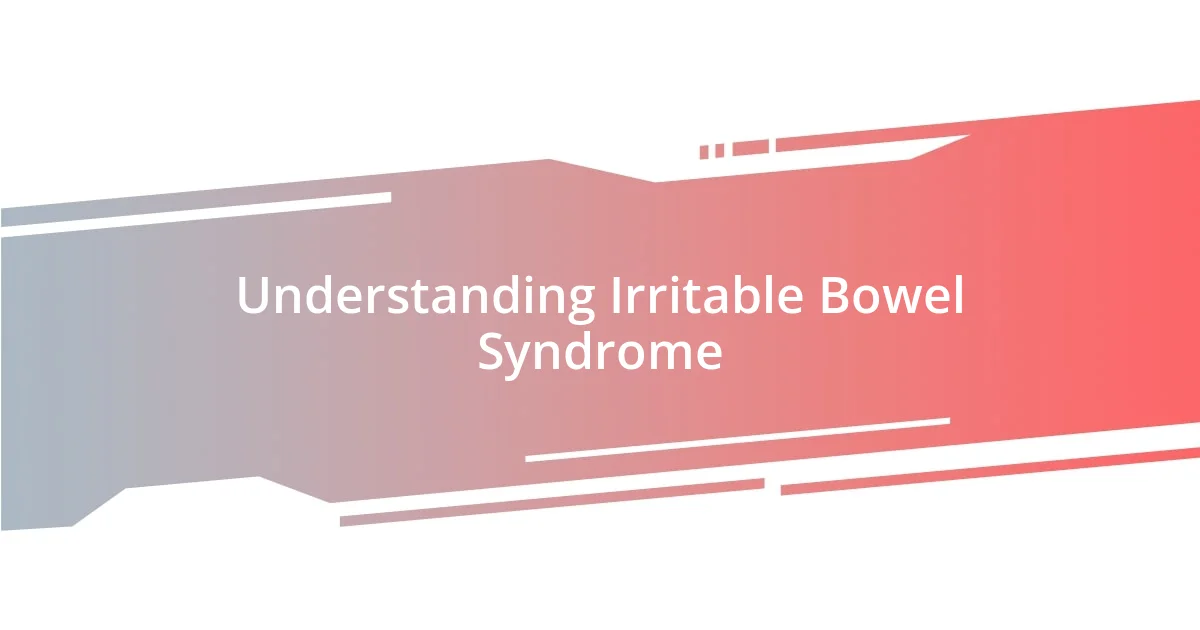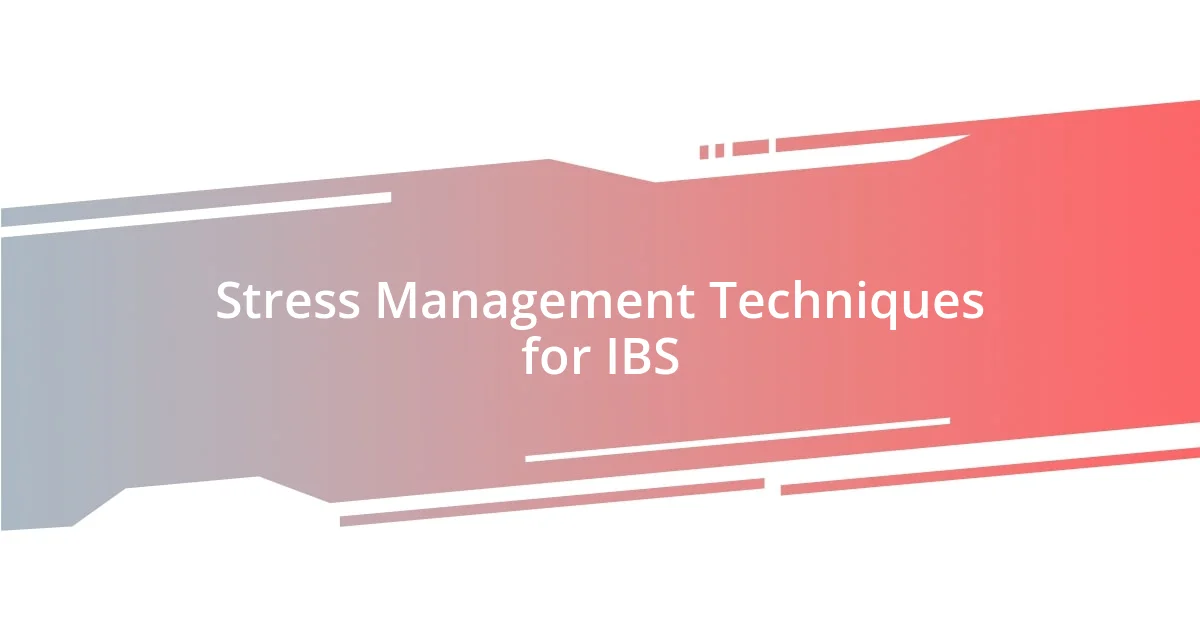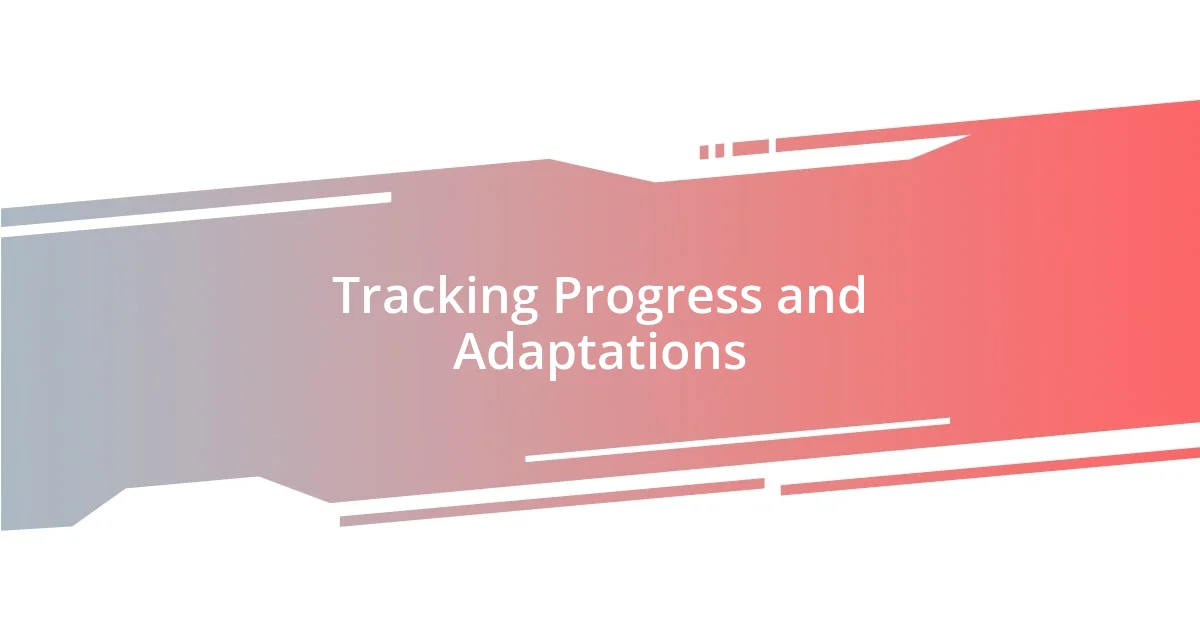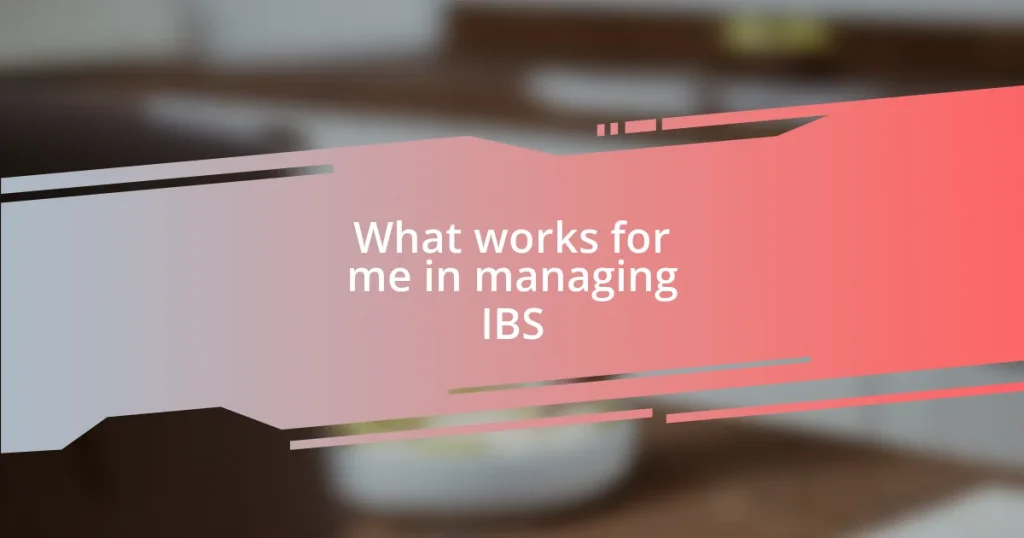Key takeaways:
- Identifying personal triggers, both food-related and emotional, is essential for effectively managing IBS symptoms.
- Dietary changes, including incorporating probiotics and mindful eating, can significantly improve gut health and overall comfort.
- Tracking progress and being flexible with management strategies allows for personalized adjustments that enhance IBS management and well-being.

Understanding Irritable Bowel Syndrome
Irritable Bowel Syndrome (IBS) can feel like a shadow that looms over daily life. I remember the frustration of trying to enjoy a meal out, only to stress about how my body might react—would it be a calm evening, or would a sudden wave of discomfort send me rushing to the nearest restroom? It’s common for many to feel isolated by these unpredictable symptoms, and that’s something I’ve often grappled with.
At its core, IBS is more than just a digestive issue; it’s a complex interplay of gut and brain. Studies show that stress and anxiety can worsen symptoms, which resonates deeply with me. Have you ever felt that knot in your stomach before a big presentation? That’s the connection between our emotions and gut health—something I continuously explore in my journey managing this condition.
Understanding IBS means recognizing that it’s a highly individualized experience. For some, certain foods trigger flare-ups, while others may find relief through changes in their lifestyle. I’ve experimented with everything from dietary adjustments to mindfulness techniques. Each person’s path to managing IBS can differ, but ultimately, we all seek that sense of balance and calm amidst the chaos of our digestive systems.

Identifying Personal Triggers
Identifying personal triggers is a crucial step in managing IBS effectively. I recall a particular time when I realized that certain foods sent my digestive system into a tailspin. It was a vivid experience at a friend’s birthday dinner; I had my favorite dish, creamy fettuccine, only to spend the next hour in discomfort. This incident made me realize just how important it is to pay attention to how specific foods affect my body.
Keeping a food diary has been incredibly helpful for me in pinpointing these triggers. By noting what I eat and how I feel afterward, patterns began to emerge, revealing foods I wouldn’t have guessed were problematic. For example, I always loved my morning coffee, but logging my symptoms taught me that it often led to bloating and discomfort. Have you considered tracking your meals and symptoms? These insights can be eye-opening and guide you in making informed dietary choices.
It’s also worth noting that emotional triggers can play a significant role in IBS flare-ups. Stressful days or lingering worries influence my gut health just as much as what I consume. I’ve had moments when simply taking deep breaths and practicing mindfulness reduced my symptoms. Acknowledging both my physical and emotional triggers has helped me form a more comprehensive approach to managing my IBS.
| Trigger Type | Examples |
|---|---|
| Food | Dairy, Gluten, High-FODMAP foods |
| Emotional | Stress, Anxiety, Lack of sleep |

Dietary Changes for IBS Management
Dietary changes can significantly influence the management of IBS. I remember the first time I eliminated gluten from my diet; it felt like losing an old friend. However, the relief that followed was undeniable. I discovered that integrating a low-FODMAP diet has helped many find balance. It’s not just about what you take out but also what you include to nourish your body without triggering discomfort.
Here are some dietary changes I’ve found beneficial:
- Incorporate fiber: Soluble fiber from oats, bananas, and carrots can ease symptoms.
- Stay hydrated: Drinking plenty of water supports digestion and can reduce bloating.
- Explore fermented foods: Items like yogurt and kefir can promote gut health, yet I always recommend monitoring your body’s response.
- Limit processed foods: These can be full of additives that may irritate the gut.
- Experiment with portion size: Eating smaller meals has made a measurable difference in my comfort levels.
Adjusting my diet wasn’t just about food avoidance; it fostered a deeper connection with my body. For instance, when I switched to almond milk instead of cow’s milk, my bloating symptoms lessened noticeably. The emotional aspect plays a huge role too. I used to feel anxious about big meals with friends, but now I focus on eating mindfully and choosing foods that bring me comfort rather than causing stress. Celebrating food is essential, and it’s a game-changer to replace worry with awareness.
Incorporating elements like mindful eating and listening to my body’s signals has become a routine. I’ve learned to savor every bite and recognize when to stop. The journey may feel daunting, but every small adjustment is a step toward understanding my unique needs. Ultimately, finding what resonates with you can turn the tide in managing IBS.

Incorporating Probiotics in Diet
Incorporating probiotics into my diet has been a game-changer for managing my IBS. I remember trying yogurt for the first time, hoping it would work wonders. To my surprise, I felt a noticeable improvement in my digestion and overall comfort level. Probiotics are the beneficial bacteria that help balance your gut flora, and I find that consuming fermented foods, like kefir or sauerkraut, adds a vibrant touch to my meals while nurturing my gut health.
When it comes to choosing the right probiotics, I’m often overwhelmed by the variety available. Each strain can affect the gut differently, so I took the time to research which ones work best for IBS symptoms. I’ve leaned towards ones like Lactobacillus and Bifidobacterium, as they’ve been shown to ease bloating and abdominal pain for me. Have you ever noticed how a simple change in your diet can shift your entire mood? Adding probiotics not only helps my digestive system but also gives me a natural boost in energy.
I’ve learned that consistency is vital with probiotics. It took a few weeks of regular intake for me to really notice their benefits. There were moments of doubt—wondering if this was just another fad—but ultimately, listening to my body has been my best guide. I encourage you to give it a try and see how your body responds. The journey into probiotics has been rewarding, allowing me to foster a healthier relationship with food and my gut.

Stress Management Techniques for IBS
Stress can be a significant trigger for IBS symptoms, so finding effective stress management techniques has been crucial for me. One approach I’ve embraced is deep-breathing exercises. I remember the first time I sat down, closed my eyes, and focused solely on my breath; it felt like a rush of calm enveloped me. This simple technique helps me ground myself whenever I feel the weight of anxiety creeping in, allowing me to create a mental buffer against stress.
Another technique that transformed my approach is regular mindfulness meditation. Initially, I found it challenging to quiet my mind, but as I honed my practice, I began to notice a profound change in my overall well-being. It’s fascinating how a few minutes of stillness can help declutter my thoughts and ease my nerves. Have you ever experienced the chaotic swirl of a busy mind during stressful times? For me, taking those moments to meditate has not only improved my mental clarity but also eased the physical symptoms of IBS.
Exercise also plays a vital role in managing stress for me. I discovered that activities like yoga and brisk walking serve as perfect outlets for pent-up energy and anxiety. One of my favorite memories is joining a yoga class one afternoon, where we focused on gentle stretches and breathing techniques. Leaving that class, I felt lighter and more at ease in my body. It’s remarkable how movement can reduce stress, invigorate your mood, and ultimately lead to better digestive health. I encourage you to explore different stress-relief methods. You might find surprising techniques that resonate with you, just as I did.

Practical Lifestyle Adjustments
Making practical lifestyle adjustments has been key for me in managing my IBS. One adjustment that I can’t recommend enough is keeping a food diary. This simple practice has given me remarkable insights into my triggers. I still remember the hassle of jotting down each meal and how I felt afterward, but it was illuminating. Have you ever played detective with your own health? That process helped me identify certain foods that just didn’t sit right with me, empowering me to make informed choices moving forward.
In addition, I’ve found that regular meal times help stabilize my digestive system. Adopting a routine where I eat at consistent times has made a noticeable difference. Some days, it feels challenging to resist the urge to snack randomly, but setting meal schedules helps my body prepare for digestion. It’s almost as if my gut appreciates the rhythm, and the reduction in unexpected flare-ups has been worth the effort.
Lastly, I’ve started embracing smaller, more frequent meals instead of the traditional three larger ones. I can still recall the discomfort of feeling overly stuffed after a big dinner—definitely not ideal for IBS. Now, opting for smaller portions has not only lessened my bloating but also turned me into a more adventurous eater. It encourages me to explore a variety of foods throughout the day. Have you considered this approach? If you’re looking for a way to enhance your relationship with food, giving smaller meals a shot might just be the solution you need.

Tracking Progress and Adaptations
Tracking my progress with IBS has been an eye-opening journey. I began by creating a simple log to document not just what I ate but also how I felt afterwards. This personal charting revealed patterns I hadn’t noticed before. Have you ever been surprised by how your body reacts to certain foods? For me, connecting the dots between my meals and symptoms was like finding a puzzle piece that finally fit, steering me toward healthier choices.
Adapting my approach has been essential as I’ve discovered new strategies that resonate with me over time. I remember the confusion I experienced when my initial methods didn’t yield the results I hoped for. This prompted me to try different approaches, like adjusting my fiber intake slowly rather than all at once. Each time I made a change, I would monitor the results closely. It’s fascinating how something as simple as a small tweak can lead to substantial improvements in my comfort levels.
I can’t emphasize enough the importance of being flexible in this process. For instance, I once noticed that while certain foods were deemed “safe,” they weren’t as nourishing for my gut as I thought. Instead of becoming discouraged, I used this as an opportunity to explore new ingredients and recipes, broadening my culinary horizons. Have you ever felt the thrill of discovering something unexpected that works for you? That’s the beauty of tracking—you’re not just recording data; you’re actively shaping your wellbeing and adapting to your unique needs.















